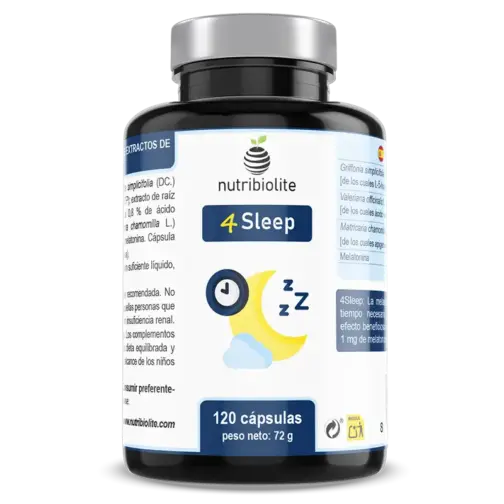A new international study, published in JMIR Formative Research 2025(see full study), has looked at how melatonin and its natural precursors influence sleep and the subjective experience of rest. The trial involved healthy adults who followed simple night-time habits, such as light dinners and reduced artificial light, along with the incorporation of nutrients such as tryptophan and 5-HTP. The results show that small actions and adjustments can improve the ease of falling asleep and the feeling of stable rest, without the need for pharmacological interventions.
What does this mean for you? The study suggests that a combination of gentle routines and certain nutrients can help synchronise your internal rhythm and improve sleep quality. If you are over 40 or work irregular shifts, these changes may be especially helpful because natural melatonin production tends to decline with age and changes in routine. Incorporating light dinners, avoiding screens before bedtime and taking care of your natural tryptophan and 5-HTP intake can make a difference to your night.
The body’s natural melatonin pathway
Melatonin is a key hormone that marks the start of a good night’s rest. Its production depends on the light-dark cycle and also on what we eat and feel at the end of the day. Foods rich in tryptophan, such as nuts, bananas or oats, are first converted into 5-HTP, then serotonin and finally melatonin during the night. This physiological process helps prepare the brain for deep and stable sleep.
From the age of 40 or in situations of frequent stress, this chain can be weakened. It is therefore useful to reinforce it with healthy night-time habits and, if necessary, with supplements that respect the same natural pathway.
Gentle rituals to prepare the body for rest
Getting a good night’s sleep starts long before bedtime. The study highlights that reducing intense light an hour before bedtime, eating a light dinner and avoiding screens favours the physiological release of melatonin. The body interprets these signals as an invitation to start the internal sleep cycle.
It is not just a question of the number of hours slept, but of achieving continuous, restorative rest. Keeping regular schedules and eating simple dinners helps to ensure that the transition to sleep is natural and without night-time disturbances.
Why combine melatonin, 5-HTP and soothing plants?
Although many supplements rely on melatonin alone, the evidence points to greater efficacy when combined with natural precursors and botanical extracts. 5-HTP, derived from Griffonia simplicifolia, is directly involved in the formation of serotonin and melatonin. Plants such as valerian and chamomile, which have been used for centuries, complement this effect by promoting relaxation without causing dependence or drowsiness upon awakening.
This physiological synergy respects internal rhythms and offers gentle support in times of imbalance due to age, travel or stress.

Melatonin 1 mg and 5-HTP with relaxing plants to facilitate the onset of rest, as a complement to specific nocturnal habits. Responsible use.
Frequently asked questions about melatonin sleep and 4Sleep
How does 4Sleep work in the natural sleep cycle?
4Sleep follows the body’s physiological pathway by combining fast melatonin, plant-based 5-HTP and standardised valerian and chamomile extracts. It thus supports both the onset and maintenance of a good night’s rest without causing dependence or residual drowsiness.
Why not use melatonin alone?
Melatonin alone signals the onset of sleep but does not maintain it throughout the night. The addition of 5-HTP and relaxing plants helps to sustain the full cycle and improve the subjective feeling of continuous rest.
When should I take 4Sleep to notice its effects?
Take one capsule about 30 minutes before bedtime, always at the same time to reinforce your circadian routine. Most people notice benefits within two to four weeks after regular use with consistent habits.
Does 4Sleep cause dependence or a hangover feeling?
No. Its formula contains no sedative drugs or synthetic additives. The ingredients act on natural pathways without altering sleep mechanisms or creating tolerance or dependence.
Is it safe to combine with tryptophan-rich foods?
Yes. Dining on foods such as nuts or other foods rich in tryptophan enhances the natural pathway to melatonin. 4Sleep’s balanced formula reinforces this process when you need extra support to sleep better.
This content is informative and is not a substitute for the advice of a healthcare professional.
















